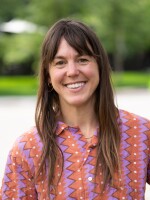It’s been a smoky summer on the Western Slope with multiple large wildfires burning in the region. Smoke contains a potent mix of pollutants and poses serious health risks, especially for those who are pregnant.
Pregnancy puts extra strain on the respiratory system, as the body needs to take in more oxygen for the fetus while trying to get rid of the extra carbon dioxide that the fetus produces.
“We like to say people are breathing for two,” said Jonathan Hirshberg, a maternal fetal medicine and pulmonary critical care specialist at the University of Colorado School of Medicine.
When the heart and lungs are working at the extreme edge of their capacity, that puts a pregnant person at higher risk for complications from respiratory illnesses like Asthma, COVID-19 and the Flu.
“When you expose those people to wildfire, it tends to make those folks sicker,” said Hirshberg.
A 2024 study in California found that exposure to the particle pollution in wildfire smoke also increases the risk of preterm birth. Specifically, when a pregnant person was exposed to particles classified as PM 2.5 — a common particle size in wildfire smoke — they had a higher chance of giving birth before 37 weeks.
However, Hirshberg noted that the effects of wildfire smoke on preterm birth are not well understood, and more studies are needed to determine the exact causal pathway. For instance, is it the particulate matter itself that a person breathes in, or all the stress associated with a wildfire?
That lack of knowledge is worrisome to Hirshberg, since climate change will almost certainly exacerbate wildfire smoke pollution in the coming years.
“It's easy for me to recommend, ‘Pick up and move to a place without wildfire exposure,’” he said. “But in reality, it's a lot to ask of someone and very expensive, especially at a time in their life when they're stressed, both emotionally and financially.”



